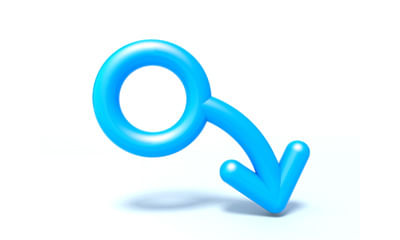Sex Chromosome Abnormalities
Hi, I am getting a low volume of semen in sex, these many days I am performing good and in recent past I am been feeling ...
Ask Free Question
Hello- several conditions affecting the reproductive system can impact semen volume. These include: an obstruction or blockage. If both ejaculatory ducts are blocked, the result is a low volume of semen without sperm. Having one duct blocked or both ducts partially obstructed can also reduce semen volume. This may be caused by a condition at birth, seminal vesicle stones, cysts in the ducts, or scarring resulting from inflammation or surgery. A blockage can be found with an ultrasound. Prostate issue. Since the prostate is responsible for making 20–30% of semen, low semen volume may be a symptom of prostate cancer or another prostate issue. Dehydration. Water makes up a significant percentage of semen. Being dehydrated may lead to lower semen volume. Hypogonadism (low testosterone levels). Insufficient testosterone affects the function of the reproductive organs that produce the fluids for semen. Reduced secretions can cause low semen volume. Congenital absence of seminal vesicles. Since seminal vesicles contribute the majority of the fluid in semen, being born without them results in low semen volume. In these cases, the semen is usually acidic (which can harm sperm) and less than 0.5 ml in volume. Retrograde ejaculation. With retrograde ejaculation, either some or all of the semen is directed into the bladder instead of out of the urethra during orgasm. This reduces semen volume or eliminates it entirely (called “dry orgasm”). Retrograde ejaculation may be caused by an injury, pelvic or spinal cord surgery, or drugs like alpha blockers that keep muscles in the bladder from contracting. It can be diagnosed by performing a urinalysis after ejaculating to look for sperm. Genetic abnormalities. Genetic infertility conditions like klinefelter syndrome, where there’s an extra x chromosome present at birth, can lead to lower semen volume. A semen analysis may help identify the cause of low semen volume. For example, a low sperm count can suggest a duct obstruction, while a lack of fructose in the semen may indicate an issue with the seminal vesicles. If the analysis appears normal besides the reduced semen volume, the issue may be partial retrograde ejaculation or improper collection of the semen.
Hello, i'm simon ,i need help doctors concerning low sperm count/zero to be honest. ...
Ask Free Question
Low sperm count symptoms might include: problems with sexual function — for example, low sex drive or difficulty maintaining an erection (erectile dysfunction) pain, swelling or a lump in the testicle area. Decreased facial or body hair or other signs of a chromosome or hormone abnormality. What does it mean if your sperm count is zero? Azoospermia, which accounts for 10 to 15 percent of all male infertility, refers to a complete absence of sperm in your ejaculate. Azoospermia can be due to a sperm production defect that can be triggered by various hormonal or genetic defects.
Low sperm count .i am taking speman ans ashwagandha for 3 month but I am not getting result what to do. ...
Ask Free Question
Hello- ayurveda does not mean finding a random drug over internet and starting it by your own. Its not that simple. Problems with male fertility can be caused by a number of health issues and medical treatments: varicocele. A varicocele is a swelling of the veins that drain the testicle. It's the most common reversible cause of male infertility. Although the exact reason that varicoceles cause infertility is unknown, it may be related to abnormal blood flow. Varicoceles lead to reduced sperm quantity and quality. Infection. Some infections can interfere with sperm production or sperm health or can cause scarring that blocks the passage of sperm. These include inflammation of the epididymis (epididymitis) or testicles (orchitis) and some sexually transmitted infections, including gonorrhea or hiv. Although some infections can result in permanent testicular damage, most often sperm can still be retrieved. Ejaculation issues. Retrograde ejaculation occurs when semen enters the bladder during orgasm instead of emerging out the tip of the penis. Various health conditions can cause retrograde ejaculation, including diabetes, spinal injuries, medications, and surgery of the bladder, prostate or urethra. Antibodies that attack sperm. Anti-sperm antibodies are immune system cells that mistakenly identify sperm as harmful invaders and attempt to eliminate them. Tumors. Cancers and nonmalignant tumors can affect the male reproductive organs directly, through the glands that release hormones related to reproduction, such as the pituitary gland, or through unknown causes. In some cases, surgery, radiation or chemotherapy to treat tumors can affect male fertility. Undescended testicles. In some males, during fetal development one or both testicles fail to descend from the abdomen into the sac that normally contains the testicles (scrotum). Decreased fertility is more likely in men who have had this condition. Hormone imbalances. Infertility can result from disorders of the testicles themselves or an abnormality affecting other hormonal systems including the hypothalamus, pituitary, thyroid and adrenal glands. Low testosterone (male hypogonadism) and other hormonal problems have a number of possible underlying causes. Defects of tubules that transport sperm. Many different tubes carry sperm. They can be blocked due to various causes, including inadvertent injury from surgery, prior infections, trauma or abnormal development, such as with cystic fibrosis or similar inherited conditions. Blockage can occur at any level, including within the testicle, in the tubes that drain the testicle, in the epididymis, in the vas deferens, near the ejaculatory ducts or in the urethra. Chromosome defects. Inherited disorders such as klinefelter's syndrome — in which a male is born with two x chromosomes and one y chromosome (instead of one x and one y) — cause abnormal development of the male reproductive organs. Other genetic syndromes associated with infertility include cystic fibrosis and kallmann's syndrome. Problems with sexual intercourse. These can include trouble keeping or maintaining an erection sufficient for sex (erectile dysfunction), premature ejaculation, painful intercourse, anatomical abnormalities such as having a urethral opening beneath the penis (hypospadias), or psychological or relationship problems that interfere with sex. Celiac disease. Celiac disease is a digestive disorder caused by sensitivity to a protein found in wheat called gluten. The condition may contribute to male infertility. Fertility may improve after adopting a gluten-free diet. Certain medications. Testosterone replacement therapy, long-term anabolic steroid use, cancer medications (chemotherapy), some ulcer drugs, some arthritis drugs and certain other medications can impair sperm production and decrease male fertility. Prior surgeries. Certain surgeries may prevent you from having sperm in your ejaculate, including vasectomy, scrotal or testicular surgeries, prostate surgeries, and large abdominal surgeries performed for testicular and rectal cancers, among others.
Main pahle homeopathic treatment le chuka hu 2 mah tak fir bhi koi positive results nahi aya. Count nil hi raha isliye i ...
Ask Free Question
I hope you mean sperm count. U need to find out cause of azoospermia. Azoospermia is the medical condition of a man whose semen contains no sperm. Azoospermia can be classified into three major types 1. Pretesticularâ inadequate stimulation of otherwise normal testicles and genital tract. Follicle-stimulating hormone (fsh) levels are low. Examples include hypopituitarism (for various causes), hyperprolactinemia, and exogenous fsh suppression by testosterone, chemotherapy. Pretesticular azoospermia is a kind of non-obstructive azoospermia. 2. Testicularâ in this situation the testes are abnormal, atrophic, or absent, and sperm production severely disturbed to absent. Fsh levels tend to be elevated as the feedback loop is interrupted. Causes for testicular failure include congenital issues such as in certain genetic conditions (e.g. Klinefelter syndrome), some cases of cryptorchidism or sertoli cell-only syndrome as well as acquired conditions by infection (orchitis), surgery (trauma, cancer), radiation, testicular azoospermia is a kind of non-obstructive azoospermia. Generally, men with unexplained hypergonadotropic azoospermia need to undergo a chromosomal evaluation. 3. Post testicularâ sperm are produced but not ejaculated, the main cause is a physical obstruction (obstructive azoospermia) of the posttesticular genital tracts. The most common reason is a vasectomy done to induce contraceptive sterility.[6] other obstructions can be congenital (example agenesis of the vas deferens as seen in certain cases of cystic fibrosis) or acquired, such as ejaculatory duct obstruction for instance by infection. Ejaculatory disorders include retrograde ejaculation and anejaculation; in these conditions sperm are produced but not expelled. 4. Unknownâ idiopathic azoospermia is where there is no known cause of the condition. It may be a result of multiple risk factors, such as age and weight.
Hi I have a major question we had kid a year back who passed away due to microvilli disease (genetic disorder) as we mar ...
Ask Free Question
Yes dear chromosomal study is most important for it. Get chromosomal study of both partners to rule out the genetic abnormality.
Hi my name is amit my age is 30 my sperm count is nill prostatic secretion when I talk to girl my semen is thin what sho ...
Ask Free Question
Tests for a low sperm count depending on initial findings, your doctor might recommend additional tests to look for the cause of your low sperm count and other possible causes of male infertility. These can include: 1) semen analysis scrotal ultrasound. this test uses high-frequency sound waves to look at the testicles and supporting structures. Hormone testing. your doctor might recommend a blood test to determine the level of hormones produced by the pituitary gland and testicles, which play a key role in sexual development and sperm production. Post-ejaculation urinalysis. sperm in your urine can indicate your sperm are traveling backward into the bladder instead of out your penis during ejaculation (retrograde ejaculation). Genetic tests. when sperm concentration is extremely low, genetic causes could be involved. A blood test can reveal whether there are subtle changes in the y chromosome — signs of a genetic abnormality. Genetic testing might also be ordered to diagnose various congenital or inherited syndromes. Testicular biopsy. this test involves removing samples from the testicle with a needle. The results of the testicular biopsy can tell if sperm production is normal. If it is, your problem is likely caused by a blockage or another problem with sperm transport. However, this test is typically only used in certain situations and is not commonly used to diagnose the cause of infertility. Anti-sperm antibody tests. these tests, which are used to check for immune cells (antibodies) that attack sperm and affect their ability to function, are not common. Specialized sperm function tests. a number of tests can be used to check how well your sperm survive after ejaculation, how well they can penetrate an egg and whether there's any problem attaching to the egg. These tests are rarely performed and often do not significantly change treatment recommendations. Transrectal ultrasound. a small lubricated wand is inserted into your rectum to check your prostate and check for blockages of the tubes that carry semen (ejaculatory ducts and seminal vesicles). Treatment treatments for low sperm count include: surgery. for example, a varicocele can often be surgically corrected or an obstructed vas deferens can be repaired. Prior vasectomies can be reversed. In cases where no sperm are present in the ejaculate, sperm can often be retrieved directly from the testicles or epididymis using sperm retrieval techniques. Treating infections. antibiotics can cure an infection of the reproductive tract, but this doesn't always restore fertility. Treatments for sexual intercourse problems. Medication or counseling can help improve fertility in conditions such as erectile dysfunction or premature ejaculation. Hormone treatments and medications. your doctor might recommend hormone replacement or medications in cases where infertility is caused by high or low levels of certain hormones or problems with the way the body uses hormones. Assisted reproductive technology (art). art treatments involve obtaining sperm through normal ejaculation, surgical extraction or from donor individuals, depending on your specific situation and wishes. The sperm are then inserted into the female genital tract, or used for ivf or intracytoplasmic sperm injection.
When I am having sex I am not getting satisfied and the sperm isn't coming out until 15 minutes or sometimes never i. ...
Ask Free Question
Dear Lybrate user low sperm count may not always have an obvious symptom. But in some cases, an underlying problem such as an inherited chromosomal abnormality, a hormonal imbalance, dilated testicular veins or a condition that blocks the passage of sperm may cause signs and symptoms. The very basic symptoms of low sperm count might include: * problems with sexual function, like low sex drive or difficulty maintaining an erection * pain, swelling or a lump in the testicle area * decreased facial or body hair or other signs of a chromosome or hormone. Please call us your counseling is 100% confidential and free.
What's abnormal with little sperm out during erection. This happens with me on rare occasion not always. ...
Ask Free Question
Dear Lybrate User, Low sperm count may not always have an obvious symptom. But in some cases, an underlying problem such as an inherited chromosomal abnormality, a hormonal imbalance, dilated testicular veins or a condition that blocks the passage of sperm may cause signs and symptoms. The very basic symptoms of low sperm count might include: * problems with sexual function, like low sex drive or difficulty maintaining an erection * pain, swelling or a lump in the testicle area * decreased facial or body hair or other signs of a chromosome or hormone. Please call us your counseling is 100% confidential and free.
Hello Sir, Mere urethra se chipchipa fluid ejaculate ho rha h.before 4 months aur ye mainly penis me erection ke bad hi ...
Ask Free Question
Low sperm count symptoms might include: Problems with sexual function — for example, low sex drive or difficulty maintaining an erection (erectile dysfunction) Pain, swelling or a lump in the testicle area. Decreased facial or body hair or other signs of a chromosome or hormone abnormality.
Doctor my age us 22 my sperm count is also healthy but I want it to be more thick and increase the volume can I take him ...
Ask Free Question
Main sign of low sperm count is the inability to bear a child. Most couples after trying for a couple of times, will likely visit the doctor. Only at this time do they come to know the problems that they are facing. Because sadly low sperm count may not always have an obvious symptom. But In some cases, an underlying problem such as an inherited chromosomal abnormality, a hormonal imbalance, dilated testicular veins or a condition that blocks the passage of sperm may cause signs and symptoms. The very basic symptoms of Low sperm count might include: * Problems with sexual function, like low sex drive or difficulty maintaining an erection * Pain, swelling or a lump in the testicle area * Decreased facial or body hair or other signs of a chromosome or hormone.









